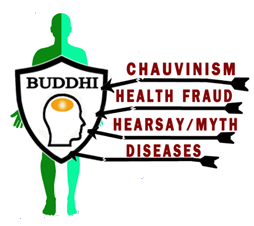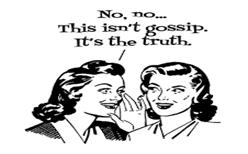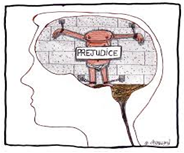Pursuing Buddhi to understand what is Correct Information

Page Links
Let us start raising and using our Buddhi, and read the following carefully,
Character traits and behaviour in beleiving in hearsay are two of the biggest enemies that blocks us from getting the real fact.. the correct knowledge.
Therefore let us resolve to Not to believing in hearsay.


We hear daily claims about what is good for our health, bad for the environment, how to improve education, cut crime, treat disease or improve agriculture. Some are based on reliable evidence and scientific rigour, Many are not. - See more at: Sense About Science
Watch on YouTube.
We perceive things around us, we hear what people say, we read books or get the messages from internet, news media and TV ads and marketing. These all are simply information which we get through our senses which may be correct or incorrect. Our senses and the ability to learning, and performing and investigating further, are a part of cognitive abilities. Exploring and controlling cognitive ability to understand what is correct or what is incorrect and using the correct knowledge for improving quality of life is Buddhi.
We start accumulating knowledge from the information given to us or we note ourselves since from the very infancy. (In fact learning begins when we are in mothers’ womb). Our schooling starts from the lap of mother, the family, and the local community. At this stage we perceive our parents and other seniors of our family and community as ideals, the leaders, and believe, and also are made to convince that whatever they say or practice is correct.
Behavior, faith, character, and practices of our parents and the seniors, influential persons like teachers clerics, remain heavily influenced by the traditions and the culture they belong to. Cultural and traditional practices and faith may be good or bad, can simply be a myth or may contain some facts. But then these cultural practices and ideas are instilled in our brain from the very childhood (as data fed into computer). Such ideas, faith information which we get from parents, family, society, tend to influence our personal thinking, liking, disliking, emotion, and intersect our perception and interpretation of phenomena during the rest of the periods of life.

These are referred to as prejudices or preconceived ideas.
Today, the word prejudice has come to seem synonymous with bigotry. Prejudices remain a biggest barrier to cross, finally to get to understanding the correct knowledge from the information.
Pursuing for Buddhi can help person to free his or her mind from the slavery to prejudices, and *confirmation bias.
*(In psychology and cognitive science, confirmation bias (or confirmatory bias) is a tendency to search for or interpret information in a way that confirms one's own preconceptions.
Confirmation bias is a phenomenon wherein decision makers have been shown to actively seek out and assign more weight to evidence that confirms their hypothesis, and ignore or disregard evidence that confutes their favorite personalized hypothesis ...their own belief)
While common people with higher level of Buddhi can detect correct information and gain true knowledge, scientist, researchers, students and others, empowered with Buddhi can free themselves from prejudices, thus can avoid mistakes in studying / inquiring, finaly to discern the finding and deduct conclusion from Scientific investigation, research studies correctly.


